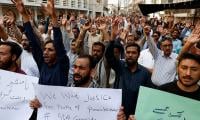With many of its main arteries closed for the past few days by protesters mourning the Machh tragedy, life in Karachi has almost come to a standstill. However, despite all these difficulties, people of Karachi seem to be generally showing a compassionate and tolerant attitude towards the evolving circumstances.
According to a statement issued by the Karachi Police office, there are 29 spots across the city where sit-ins have been staged by Shia organisations to show solidarity with the protesters of the Hazara community in Balochistan.
Azeem Qadir, who is an entrepreneur, was on his way home on the Friday evening when he encountered protesters burning tyres at Jauhar Mor. It took him around an hour to pass through a patch that is hardly 500 metres long.
Speaking to The News, Qadir said things needed to be put under control from both the sides, the protesters and the government. “The government must listen to the demands of the grieving community. It is a serious matter and needs to be handled amicably.”
He added: “The pain of Hazara community and their supporters is understandable. When someone is in extreme distress like this, which has been happening from time to time, naturally they would react in a harsh way. But they must not lose their cool and also think of others who have been commuting.”
He said the traffic should be managed by the authorities. “We live in a digital world now and almost everyone has a phone. The people should be keep posted about which route to use and which not, and police should be present on the sit-in spots to manage the traffic.” A participant of the Numaish sit-in, who wished not to be named, said the sentiments of the protesters and especially of the Hazara community were deeply hurt after the prime minister said the bereaved families were blackmailing him by demanding his visit in order to bury the slain miners.
“The PM is the head of government and in other words a father figure for the nation. I suggest Khan to revisit his comments of 2013 and reflect if he is the same person. Such actions do not suit a PM,” the protester said. He demanded the removal of the chief of the Frontier Constabulary in Balochistan.
“I once went to Balochistan and on a 50-kilometre long strip, I had to go through six different checkpoints where they search you thoroughly. If there is so much security, how come the terrorists penetrate through the checkpoints and kill innocent people?” he asked.
Zehra Zaidi, another protester, said the Shia community of Karachi was holding sit-ins in solidarity with the Hazara community and those families who had lost their loved ones in the Machh incident.
“The protesters in Karachi have the same points of demands raised by the Hazara community. The solidarity sit-ins in Karachi are not so different than the sit-ins and protests which every year people in Pakistan hold on roads across the country in solidarity with the oppressed Kashmiris. Therefore, protests in solidarity with a marginalised group is not a new trend.”
She remarked that the Hazara community was one of the smallest communities in Pakistan and they had been receiving dead bodies of their loved ones for the last two decades. Fizza Qureshi, a researcher and journalist covering minorities, said violent incidents against a specific community could not be ignored again and again.
She remarked that such protests were necessary when it came to bigger cities as the residents of bigger cities had a responsibility to speak up against atrocities in other parts of Pakistan because for better or for worse, their voice ended up being louder.
“Since Karachi is the economic hub of Pakistan, sit-ins and protests here get more media attention, so a show of solidarity from Karachi’s residents and Shia community will help amplify the voices of the Hazaras. The demand of protestors is very simple. They want safety, nothing else,” she said.
Representational image shows a rescue worker waving to make way for an ambulance. — Reuters/FileThree people lost...
This representational image shows the hands of an incarcerated person. — AFP/File The Federal Investigation...
This representational image shows the gavel in a courtroom. — Unsplash/FileA local court on Monday issued a notice...
Sindh Local Government Minister Saeed Ghani during a visit to the Nishtar Park to review the arrangements for the...
Sindh Food Authority Director General Muzamil Hussain Halepoto being presentetd souvenir by the KPC office-bearers...
In this screengrab, Sindh police chief Ghulam Nabi Memon chairs a meeting on March 25, 2024. —...







